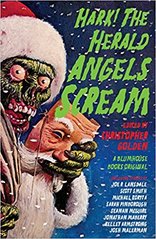
The reliable Joe R. Lansdale presents an effective ghost story as well: "The Second Floor of the Christmas Hotel," about the disappearance of a guest and a man who has been haunted by events in the decades to come, is atmospheric and perfectly pitched. I also appreciated the darkly sarcastic absurdity of Jeff Strand's "Good Deeds," about a self-absorbed narrator whose questionable act of kindness (and subsequent artistic inspiration) results in mass deaths.
Bestselling author Scott Smith has accomplished something laudable. He is perhaps the first writer I've come across who actually uses second-person narration effectively and unobtrusively. What makes his uses of "you" and "your" unique? In the excellently observed "Christmas in Barcelona," he puts the reader in the shoes of a very specific and sympathetic character, a husband and father who is trying to do the best for his traveling wife and baby son while absolutely everything goes wrong on an ill-timed European trip. It's an instantly identifiable situation for any reader, and you root for "you", even as the tale concludes with a nasty sting. The sharp twist of final lines and frightening realizations can also be found in two strong early stories, "Fresh as the New-Fallen Snow" by Seanan McGuire and "Absinthe and Angels" by Kelley Armstrong.
The spirit of current torture-horror movies such as the Saw series is captured in "Yankee Swap" by John M. McIlveen. There's the same gruesome fascination of being at the mercy of a violent killer, with the principal question always, Will they live or die at the hands of a maniac? And like those movies, this story shares the genre's weakness of not having much of anything to say. Still, it's a page-turner, even as plot outdistances character and discernible theme.
There were a few stories in the anthology that didn’t resonate with me, and that's to be expected in a multiple-author collection. I briefly mention the final story, though: "The Hangman's Bride" by Sarah Pinborough is a competent ghost story, introducing a sympathetic Dickens-era chimney-sweep protagonist with Japanese Onryo horror legend (think The Ring). But at four times the length of most of the other tales, it felt tedious to push through, especially as the complete plot could have been delivered at half the page count.
The two stories that truly resonated – I'm still thinking about them days later – were the ones that used horror and fantasy to say something larger and bolder about humanity, family, and the cycle of life and death. "Snake's Tail," Sarah Langan's ambitious examination of primal destruction and rebirth (and the great pain that necessarily accompanies it), is boldly approached and executed. Its narrator wants us to see what happens when human hopes and hubris are finally stripped of religious trappings and unearned expectations (my neighbors may be doomed, but surely I'll be saved), if only to make us conscious of the inevitable end awaiting us all. And Angela Slatter's brief "Honor Thy Mother" is a somber yet strong first-person account rooted in a moment of real-world domestic fears: an independent elderly woman realizes that her children are planning to remove her from her house, only to let her die in a retirement home. It's a very deft, understated piece that, like "Snake's Tail," makes one think about rituals and human blindness to the reality of the ways of the world.
Hark the Herald Angels Scream is a very good anthology worth checking out. It's slated for release in October 2018, anticipating the holiday season and its frightful weather (and people). I received an advance eBook copy of the title through NetGalley in exchange for an honest review.
 RSS Feed
RSS Feed